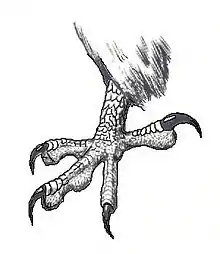claw
See also: Claw
English

Claw of the short-toed eagle, Circaetus gallicus
Pronunciation
- (UK) IPA(key): /klɔː/
- (US) IPA(key): /klɔ/
- (cot–caught merger) IPA(key): /klɑ/
audio (US) (file) - Rhymes: -ɔː
Etymology 1
From Middle English clawe, from Old English clawu, from Proto-Germanic *klawō. Compare West Frisian klau, Dutch klauw, German Klaue, Danish klo, Norwegian klo, and Swedish klo.
Noun
claw (plural claws)
- A curved, pointed horny nail on each digit of the foot of a mammal, reptile, or bird.
- A foot equipped with such.
- The pincer (chela) of a crustacean or other arthropod.
- A mechanical device resembling a claw, used for gripping or lifting.
- (colloquial) A human fingernail, particularly one extending well beyond the fingertip.
- (botany) A slender appendage or process, formed like a claw, such as the base of petals of the pink.
- 1857, Asa Gray, First Lessons in Botany and Vegetable Physiology:
- a narrow base, as the petals of a Rose, where the claw is very short
-
- (juggling) The act of catching a ball overhand.
Derived terms
- bear claw
- cat's claw
- claw frog
- claw hammer
- claw-hammer coat
- claw ring
- claw sickness
- crab claw
- declaw
- Devil's claw
- devil's claw
- get one's claws into
- hind claw
- tack claw
- tiger's claw
- toilet claw
- wolf's-claw
Translations
curved horny nail
| |||||
foot equipped with such
|
pincer of a crustacean
|
mechanical device for gripping
|
- The translations below need to be checked and inserted above into the appropriate translation tables. See instructions at Wiktionary:Entry layout § Translations.
Translations to be checked
|
Further reading
 claw on Wikipedia.Wikipedia
claw on Wikipedia.Wikipedia
Etymology 2
From Middle English clawen, from Old English clawan, clāwan, *clēn, clawian, from Proto-Germanic *klawjaną.
Verb
claw (third-person singular simple present claws, present participle clawing, simple past and past participle clawed)
- To scratch or to tear at.
- 2012, John Branch, “Snow Fall: The Avalanche at Tunnel Creek”, in New York Times:
- Using her hands like windshield wipers, she tried to flick snow away from her mouth. When she clawed at her chest and neck, the crumbs maddeningly slid back onto her face. She grew claustrophobic.
-
- To use the claws to seize, to grip.
- To use the claws to climb.
- (juggling) To perform a claw catch.
- To move with one's fingertips.
- 2011 October 15, Phil McNulty, “Liverpool 1 - 1 Man Utd”, in BBC Sport:
- De Gea was United's hero again within seconds of Hernandez's equaliser, diving to his left to claw away Dirk Kuyt's shot as he got on the end of a superb cross from Stewart Downing.
-
- (transitive, obsolete)
- To relieve an uneasy feeling, such as an itch, by scratching (someone or something); hence (figuratively), to flatter or humour (someone); to court, to fawn on.
- 1598–1599 (first performance), William Shakespeare, “Much Adoe about Nothing”, in Mr. William Shakespeares Comedies, Histories, & Tragedies […] (First Folio), London: […] Isaac Iaggard, and Ed[ward] Blount, published 1623, OCLC 606515358, [Act I, scene iii]:
- I cannot hide what I am: I must be sad when I have cause, and smile at no man's jests; eat when I have stomach, and wait for no man's leisure; sleep when I am drowsy, and tend on no man's business; laugh when I am merry, and claw no man in his humour.
- 1603, Plutarch, “Of the Novritvre and Edvcation of Children”, in Philemon Holland, transl., The Philosophie, Commonlie Called, The Morals […], London: […] Arnold Hatfield, OCLC 1051546006, page 15:
- To be ſhort, a wretched and curſed generation they be; hypocrites, pretending friendſhip, but they can not skill of plaine dealing and franke ſpeech. Rich men they claw, ſooth up and flatter: the poore they contemne and despiſe.
-
- To rail at, revile, or scold (someone or something).
- 1655, Thomas Fuller, James Nichols, editor, The Church History of Britain, […], volume (please specify |volume=I to III), new edition, London: […] [James Nichols] for Thomas Tegg and Son, […], published 1837, OCLC 913056315:
- In the aforesaid preamble, the king fairly claweth the great monasteries, wherein, saith he, religion, thanks be to God, is right well kept and observed; though he claweth them soon after in another acceptation.
-
- To do (something) quickly.
- 1667, Francisco de Quevedo Villegas, “The Sixth Vision of Hell”, in R[oger] L[’Estrange], transl., The Visions of Dom Francisco de Quevedo Villegas, […], London: […] H[enry] Herringman […], OCLC 228725377, page 181:
- Do'n't you remember, Sirrah, ſayes one, hovv vve clavv'd it avvay at ſuch a Place! Yes, ye Damn'd Rogue you, cryes t'other, vvhen you vvere ſo drunk you took your Aunt for the Bavvd.
-
- To relieve an uneasy feeling, such as an itch, by scratching (someone or something); hence (figuratively), to flatter or humour (someone); to court, to fawn on.
Derived terms
- claw away
- claw back
- claw off
Derived terms
- claw me, claw thee
Translations
scratch or tear at
|
to use claws to seize, to grip
|
use claws to climb
|
Anagrams
- cawl
Middle English
Noun
claw
- Alternative form of clawe